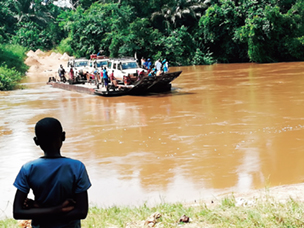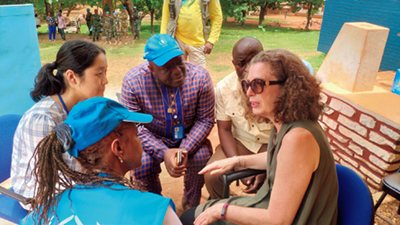Stories from the Field 2 Public nomination
Voices of Young Japanese Personnel in International Organizations Working Tirelessly on the Front Lines of Humanitarian Aid
- Saving as many lives as possible through emergency humanitarian aid coordination -

On the way to visit refugees, a ferry carries UN vehicles across a river with no bridge (Photo: KIMURA Makiha)

Exchanging opinions with the Central African Republic Resident Coordinator / Humanitarian Coordinator (on the right) and representatives of field offices of different international organizations regarding humanitarian conditions at the time of her visit to Bambari (Photo: IOM Bambari Sub Office)
From February to August 2019, I was dispatched to the Central African Republic, a country located in the center of the African continent, as a staff member of the United Nations Office for the Coordination of Humanitarian Affairs (OCHA) and coordinated emergency humanitarian aid. The country has been the site of a long-running humanitarian crisis caused by armed conflict and other factors, and 2.6 million people, which is over half of its population of 4.66 million people, require humanitarian aid. Large-scale humanitarian aid is also being carried out in the city Bambari of Ouaka Prefecture, where I was based, located in the central region of the country. A number of international organizations and NGOs are working to provide assistance across several fields including food, healthcare, water and sanitation, and shelter. OCHA undertakes coordination work to ensure that these numerous organizations and groups collaborate to provide efficient humanitarian aid without overlap or gaps. At the Bambari Field Office, I worked in a variety of roles, such as running coordination meetings, and providing reports and analysis on humanitarian situations.
In my actual coordination work, I often found myself trapped in between the conflicting opinions of the many organizations, and struggled with challenging demands. For example, in June 2019, the Resident Coordinator / Humanitarian Coordinator (RC/HC)* for the Central African Republic requested us to dispatch a humanitarian needs assessment team to Mobaye City in Basse-Kotto Prefecture as quickly as possible. In such assessments, OCHA would serve as the coordinator and take the lead to ensure that various organizations could cooperate to carry out an efficient survey. Thus, as the team leader of the assessment team, I began the preparations. An escort by the UN peacekeeping mission was required to travel to Mobaye City, which suffered from political instability. Since OCHA is also responsible for coordinating this escort, I immediately began negotiating the arrangements with the Deputy Commander of the peacekeeping mission. I learned, however, that a peacekeeping force had already been dispatched to another region which suffered from increased instability, and that an escort to Mobaye City was not immediately available. Given these circumstances, I informed the RC/HC that it would be difficult to quickly arrange the assessment, but she repeated her prior orders, “The situation is severe, we cannot wait. Figure something out and get to the region.” Therefore, I persistently continued my negotiations with the peacekeeping mission, and after changing plans two or three times, I was suddenly notified that “We can provide escort the day after tomorrow.” While the assessment team members expressed concerns about the short notice, we set out for Mobaye City.
After the assessment, OCHA is also responsible for putting together a joint response plan based on the assessment results, as well as calculating funding requirements and garnering support from the UN headquarters and donors. However, differences in the way of thinking between the different organizations often make it difficult to achieve consensus. As a matter of fact, after the Mobaye City survey, the organizations disagreed on the priority of aid and how many people the aid should cover. Although meeting after meeting would end in deadlock, I rushed to and fro negotiating, explaining, and persuading stakeholders to come to an agreement.
The final assessment report and joint response plan do not directly help the people in need. I felt great satisfaction, however, in building consensus because the report and joint response plan are essential in sharing the voices of those in the most difficult situation in Mobaye City with the world, mobilizing funding, and implementing assistance. Sharing the voices of those who need aid the most with the world also allows me to serve as an advocate for those suffering in severe circumstances with no voice. I feel that this is my mission as a staff member of OCHA.
In this way, even on the front lines of humanitarian aid, OCHA always works behind the scenes. Nevertheless, I feel passionate about my coordination work. I believe that bringing together organizations and groups with different positions and specialties, and optimizing limited funds and resources to the fullest degree leads to saving as many lives as possible.
I set out on a career in humanitarian aid at the UN through the “Program for Global Human Resource Development for Peacebuilding and Development” (see “Human Resources Development for Peacebuilding”) and the JPO Programme (see “(2) Enhancement of Human Resources and Intellectual Foundations for Development Cooperation”) run by MOFA, working in the Democratic Republic of the Congo, Chad, and Ethiopia. I then moved to the Central African Republic, and have now returned to the Democratic Republic of the Congo, working to provide emergency humanitarian aid. I am often asked, “Why did you choose to work for humanitarian aid?” To me, providing humanitarian aid to people suffering under some of the most severe conditions in the world in a humanitarian crisis is an extremely precious and noble profession, and I have a strong ambition to contribute in the field as much as I can. As a member of OCHA, I wish to continuously work to deliver quick and efficient assistance for those who are most in need, and as many people as possible.
KIMURA Makiha
Special Assistant to the Deputy Humanitarian Coordinator
United Nations Office for the Coordination of Humanitarian Affairs (OCHA)
Democratic Republic of the Congo, Kinshasa Office
* The Resident Coordinator / Humanitarian Coordinator (RC/HC) has overall responsibility for international assistance on humanitarian issues in the country of residence and also chairs a humanitarian country-specific team consisting of representatives of major international humanitarian organizations.
<< Previous Page Next Page >>
Main Text | Reference Statistics | Stories from the Field | Master Techniques from Japan to the World | ODA Topics
